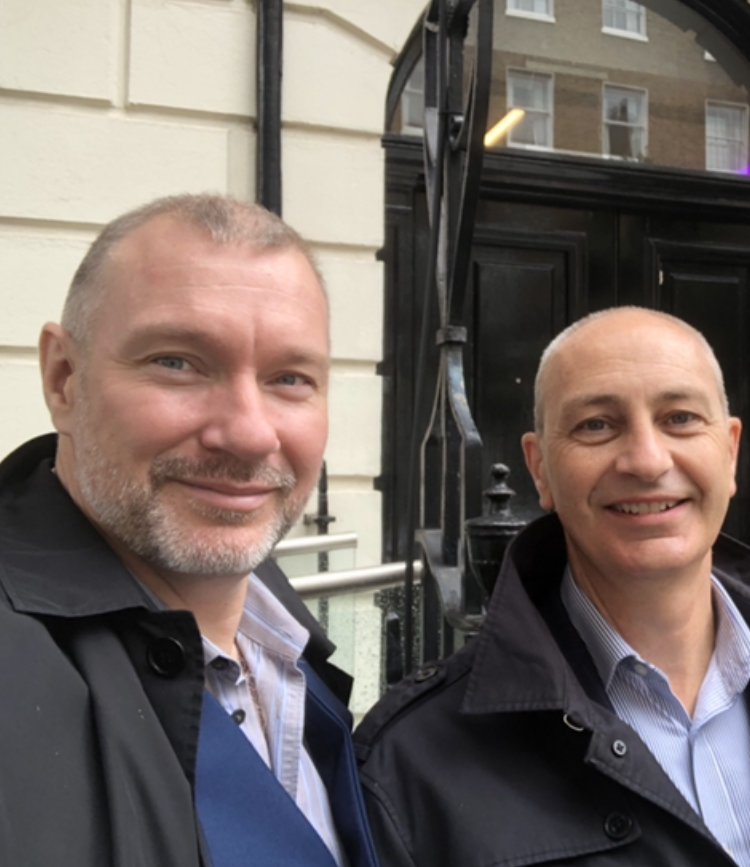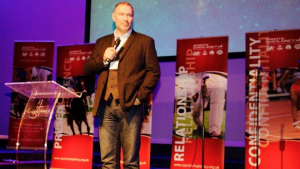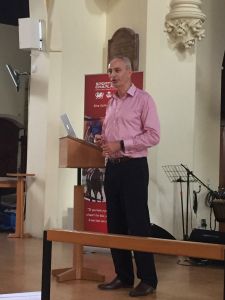Pandemic Presence: Redefining, Rediscovering, Reengaging

In Sports Chaplaincy UK (SCUK) we have five values that are fundamental to our role of chaplains in the sports world: Presence, Excellence, Relationship, Confidentiality, and Humility. These values are part of our induction training for new chaplains and continue to undergird all a chaplain does throughout his or her chaplaincy.
As the pandemic hit in the UK all sport came to a halt and chaplains, like everyone else, were housebound. Nevertheless, perhaps now more than ever, people in our sports community needed the pastoral and spiritual care of a chaplain. With this in mind I sent out a short video encouraging and challenging our chaplains to reflect on those values and how to “do chaplaincy” in these unique circumstances. The greatest challenge of this was how to be present to the community when historically it has been a ministry of physical presence. Up to this point the Word becoming flesh had always meant wandering around training grounds and sports clubs offering moments of spontaneous interaction and intimacy.
Reflecting back on the last year it is encouraging to see how both chaplains and ourselves as an organisation have embraced and responded to this challenge. Some chaplains have written blogs and articles for the club website with an opportunity for people to respond. Others have become adept at using social media with regular tweets, Instagram, or Facebook posts. One chaplain put out weekly short videos on a YouTube channel which got a lot of positive reaction from players and staff at the club. Another chaplain went old style and sent individual hand written notes to every member of the club. We all have had to get used to Zoom meetings which for some chaplains has embedded them more in the structure of the club as they have been invited into regular HR, safeguarding, and management meetings. On a spiritual level those chaplains involved in prayer and bible studies prior to the pandemic were able to take these online. At my own club, Charlton Athletic, I held weekly gatherings with some of the players on Zoom and we were able to go much deeper into the bible and issues than we ever had before, and I even conducted a short thanksgiving for the birth of a baby with one player and his partner!
Centrally in SCUK we were forced to rethink how we carried out induction training for new chaplains. Prior to the pandemic the induction was a one-day event held in person at various locations throughout the year up and down the country. For the last year we have packaged it differently with videos and Zoom gatherings so that over three evenings the same material is covered but without the expense and time needed to travel. Rather than holding back our training programme this repackaging has probably accelerated and improved our provision. Similarly we have been able to train in mental health awareness, bereavement support, and addictions online. In October last year we held our annual conference via YouTube and Zoom for the first time and were able to tackle issues around racism, diversity and equality. The added benefit as well was that we could include international delegates to the conference so we had attendees from other parts of Europe and even South Africa and Australia joining us.
And yet an honest reflection must include the failings and disadvantages of such an approach as well. Our central value of relationship is key in how presence operates. Those chaplaincies with a strong physical presence prior to the pandemic were able to develop it and even thrive virtually. But the reverse was also true and some have found it a struggle to engage, often through no fault of their own. As sport opened up again last summer after the initial lockdown some chaplains, myself included, were privileged to be invited back in to be physically present and part of player bubbles following the Covid protocols. Virtual chaplaincy had worked to a degree but individuals who could have picked up the phone to the chaplain had failed to do so and yet were keen to open up emotionally when a chaplain was standing there in front of them. It’s hard if not impossible to have those spontaneous moments of intimate interaction in a Zoom call. In terms of chaplaincy appointments, we made a policy decision as an organisation that whilst training could go on online, we wouldn’t appoint an individual to a club or sport until we had met them in person and we are already seeing the wisdom of that decision.
As we look forward and sport and society opens up we need to continue to develop a hybrid approach to the praxis of our chaplaincy and our organisational methods. Yet ultimately we are relational beings and that has to be more than two dimensional in a virtual realm. To put that another way, as we mention in our induction training the advent of chaplaincy is found in St Martin of Tours sharing his cloak with a beggar. (For more detail on this see Brad Kenney’s excellent post in this series) This may be a metaphor for our chaplaincy engagement today but it is still a metaphor best served when physically standing alongside rather than through a computer screen!
We made a policy decision as an organisation that whilst training could go on online, we wouldn’t appoint an individual to a club or sport until we had met them in person and we are already seeing the wisdom of that decision.
— MATT BAKER

Warren Evans, executive director of Sports Chaplaincy UK, cuts an imposing figure–an asset when working with ruggers.
Listen to the companion podcast.

Matt Baker, national director of England for Sports Chaplaincy UK, has built great relationships on trust and loyalty at his club, Charlton Athletic, and across all of England.


